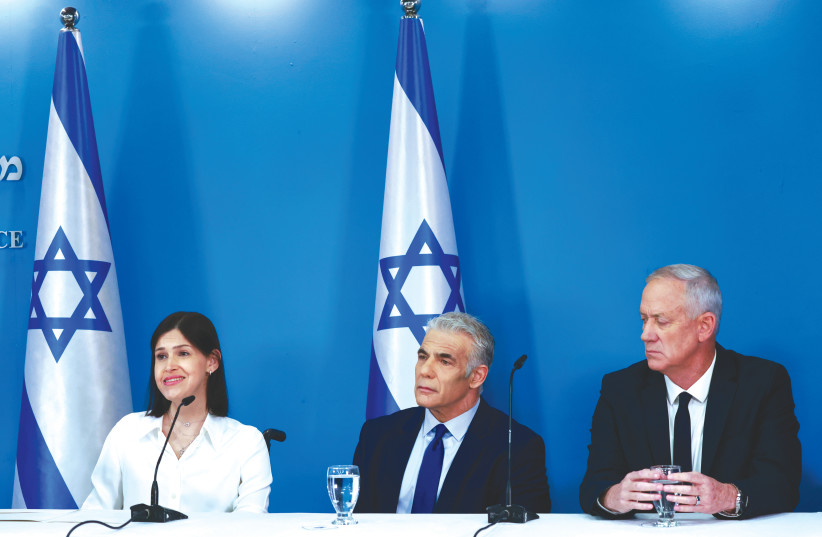US President Joe Biden pledged to provide Israel with security and economic guarantees, in a letter he is expected to give Prime Minister Yair Lapid in the coming days, in light of the historic maritime agreement the Jewish state reached with Lebanon, according to a diplomatic source.
In the letter, the US reiterates its commitment to support the IDF in defending Israel. This is about strengthening the capacity of the IDF to protect the Jewish state, including against threats against Israeli vessels and energy assets.
The text of the letter was agreed upon Friday and will be signed in the coming days, according to a diplomatic source, who briefed reporters Saturday on the content of the document which has not been made public.
Biden clarified in the document that the US recognizes the maritime boundary set by the agreement as the "status quo" and will oppose any attempt to modify that boundary unless both Israel and Lebanon agree to that change.
Should the agreement be violated, the US would stand with Israel to prevent any such attempt to undermine the deal, Biden promised Lapid in the letter.

The letter mentioned in specific the US determination to prevent Hezbollah from profiting from the deal, which sets a boundary line between two abutting gas fields, Karish and Kana , to allow both countries to peacefully extract natural gas from maritime deposits.
What was agreed in the deal?
Under the terms of the maritime agreement signed on Thursday, Israel will receive 17% of the revenues from the Sidon-Kana field. The US will support Israel's receipt of those revenues, the letter explains.
Overall the document exceeds policy statements already made by the US with respect to the agreement as it pledged to back up Israel's security and economic rights.
The letter which is likely to be signed prior to Tuesday's election acknowledges Lapid's role in helping achieve the deal which it explains is a first step to promoting stability between Israel and Lebanon.
Biden in the letter also reaffirms the importance of strong US-Israel relations as defined by the Jerusalem Declaration which both he and Lapid signed in July when the US President visited Israel.
At the UN Security Council in New York the US Ambassador to the UN Linda Thomas-Greenfield lauded the deal, which she said secures the interests of both countries and sets the stage for a more stable and prosperous region" and "underscores" Biden's vision for the Middle East.
On Friday Defense Minister Benny Gantz discussed the deal in a meeting with US Special Presidential Coordinator Amos Hochstein. He thanked him and the Biden administration for the "critical role" he played in negotiating the deal with Gantz said strengthens both regional stability and Israeli security.
In Lebanon outgoing Lebanese President Michel Aoun lauded the deal, noting that Hezbollah threats against Israel helped secure favorable terms for his country.
He told Reuters that the powerful Iran-backed armed group Hezbollah, which sent unarmed drones over Israel and threatened to attack its offshore rigs multiple times, had served as a "deterrent" that had helped keep the negotiations going in Lebanon's favor.
"It wasn't coordinated (with the government). It was an initiative taken by Hezbollah and it was useful," Aoun said, adding that the Lebanese army "had no role" in this regard.
Aoun is set to leave the presidential palace on Sunday, a day before his six-year term ends,
He said the deal paved the way for gas discoveries that could be Lebanon's "last chance" at recovering from a three-year financial meltdown that has cost the currency 95% of its value and pushed 80% of the population into poverty.
A Cypriot delegation in Lebanon on Friday for talks on maritime border delineation between the two countries, said any disputes during that process could be easily resolved.
"There is no problem between Lebanon and Cyprus that cannot be resolved easily," said Cypriot special envoy Tasos Tzionis, after meeting with outgoing Lebanese President Michel Aoun.
Lebanon and Cyprus reached a maritime border agreement in 2007 but it was never ratified by Lebanon's parliament and therefore never went into force.
Aoun said the next step following that achievement would be delineating Lebanon's maritime boundaries with northern neighbor Syria and resuming talks with Cyprus to the west.
A planned visit this week to Damascus by a top Lebanese delegation was indefinitely postponed after the Syrian government told Beirut it was "not the right time".
Lebanon's deputy speaker of parliament and border negotiator Elias Bou Saab said on Friday said Syria was still the priority.
"We will not delineate with Cyprus until we communicate with Syria," Bou Saab told reporters at the presidential palace.
Reuters contributed to this report
